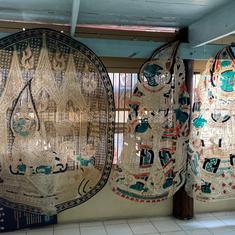All information sourced from publishers.
Silent Journeys, Benyamin, translated from the Malayalam by Anoop Prathapan
In Benyamin’s Silent Journeys, we trace the voyage of Mariamma, a young nurse from Kerala who travelled from her hometown in Manthalir all the way across the world. Nothing was known of her journey until many decades later, when a curious great grandson began his investigations only to stumble across a tale of great adventure, hardship, resilience, and love.
The novel reflects upon terrific stories of unaccompanied and courageous journeys that many valiant women, primarily nurses, have made through history, reaching the coldest places in the Arctic, Canada, remote tribal locations in the desert, the interiors of the dark continent, and almost everywhere in Europe.

Burns Boy, Krupa Ge
A fifteen-year-old in a burns ward is tormented by the events that led him to the hospital. His mother and sister have their own versions of what happened, causing the reader to reconsider the truth of what the boy says, but also see it anew. All of them are right, and yet, they are all guilty in a way. The question is: which of them is more guilty?

The Remnants of Rebellion, Ponnu Elizabeth Mathew
Aleyamma, a tormented young artist, arrives at a bungalow in Puthuloor that she inherited from her late grandfather, Eesho. The manor on top of the hill – a remnant of British colonisation – bears scars of violence. Locals murmur of gruesome murders that have stained its past and ghosts that lurk in its corners.
Decades ago, when young Eesho had first arrived at the bungalow as the supervisor of the rubber plantation, along with his wife and their faithful dog, life had seemed blissful. But beneath the quiet, unrest simmered as estate workers banded together against the owners, and whispers of a rising radical-left Naxalite movement grew louder. As the turmoil escalated, it threatened to sweep away everything that Eesho held dear.
Now, even as Aleyamma is consumed with grief over the loss of her grandfather, the dark history of her inheritance makes its presence known. Estranged from her Syrian Christian family, Aleyamma sets out to untangle the knots of the past. What stories will she uncover? Will she be able to draw strength from them to confront the present?

Tagore Never Ate Here, Mohammad Nazim Uddin, translated from the Bengali by V Ramaswamy
When ace detective Noore Chhafa arrives in the sleepy town of Sundarpur to probe a series of unexplained disappearances, he becomes entangled in a web of secrets surrounding a mysterious restaurant named Tagore Never Ate Here and its enigmatic owner, Mushkan Zubeiri. As Chhafa delves deeper into the case, he uncovers a chilling connection between Mushkan's past, a gravedigger's eerie predictions and a decades-old tragedy.
As the line between culinary artistry and sinister manipulation blurs with each revelation, Chhafa finds himself navigating local politics, supernatural occurrences and his own growing obsession with the truth. But in a town where every meal could be your last, will he become the next victim of Mushkan’s irresistible cuisine?

Angalityat: The Step Child, Joseph Macwan, translated from the Gujarati by Rita Kothari
Angaliyat tells the story of oppression and exclusion by transforming the vanquished into the victor, by turning the periphery into the core. The portrayal of Methi and Kanku as “pure” women challenges the age-old perceptions of higher castes, which denigrate the practice of remarriage among “backwards” communities. The stepchild who follows the mother to a new home, holding her finger or angali, remains on the periphery of the stepfather’s family. Caught in external and internal forms of colonisation, the community of weavers, the Vankars, is subject to oppression from the more powerful upper caste of the Patels.

Whose Urdu Is It Anyway?: Stories by Non-Muslim Urdu Writers, edited and translated by Rakhshanda Jalil
Is Urdu the language of Muslims? Or, to be more precise, the language of Indian Muslims?
In modern-day India, is Urdu a language of Upper India? What of the Deccan plateau, then, which was once the cradle of Urdu? Can the India south of the Vindhyas lay claim to Urdu? What of the sweet cadences of the Urdu of the Malwa region or the princely states of Bhopal and Hyderabad or even the rural hinterland of present-day Telangana, which has suffused Urdu with a lilting charm over a period of slow distillation spanning several centuries?
So, whose Urdu is it anyway? As long as Urdu is yoked to a religion – Islam – and a certain community – the Muslims – it will never be understood in its entirety.
This collection of 16 short stories, entirely by non-Muslim Urdu writers, is an attempt to bust stereotypes and address a persistent misconception: that Urdu is the language of India’s Muslims and that it addresses subjects that are, or should be, of concern to Muslims, and Muslims alone. It locates Urdu in its rightful place – in the heart of Hindustan.











